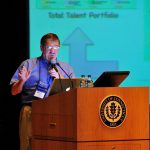A team of Neag School of Education researchers is developing a new initiative designed to help educators overcome language barriers to identify gifted students among English learners. Project EAGLE (Eliciting Advanced Gifted Learning Evidence) is one of several gifted education grants at UConn, including the National Center for Research on Gifted Education (NCRGE), that address inequity in schools.
A team of Neag School of Education researchers is developing a new initiative designed to help educators overcome language barriers to identify gifted students among English learners.
Sally Reis, the Leticia Morgan Chair in Educational Psychology at the Neag School of Education, first connected to the University of Connecticut during her master’s program at Southern Connecticut State University in the mid-1970s. While in one class, she heard UConn Board of Trustees Distinguished Professor Joseph Renzulli talk about his work in educational psychology, specifically his internationally-known and pioneering work in gifted and talented with the Enrichment Triad Model.
The argument for special schools for “gifted” kids is supported by the definition of “giftedness” proposed by people like researcher Dr. Joseph Renzulli, director of the University of Connecticut’s National Research Center on the Gifted and Talented.
Aditya Birla Education Academy (ABEA), India’s leading professional development institute for teachers has partnered with the Renzulli Center for Creativity, Gifted Education, and Talent Development, University of Connecticut, US. The purpose of the collaboration is to introduce a six-week-long Schoolwide Enrichment Program for teachers. Both the prominent institutes aim at providing teachers with opportunities to learn and grow through the Schoolwide Enrichment Program.
Joseph Renzulli served as founding director of the Neag Center, the Lynn and Ray Neag Endowed Chair for Talent Development, as well as the first director of the National Research Center on the Gifted and Talented (NRC/GT), then one of a dozen centers in the U.S. focused on addressing significant issues in the education of gifted and talented students, and enrichment education. Under Renzulli’s guidance, the Neag Center evolved into one of the leading centers in gifted education and talent development in the world.
On September 22, the Duke University Talent Identification Program (Duke TIP) welcomed Dr. Del Siegle, who is a professor in the University of Connecticut’s Neag School of Education and the director of the National Center for Research on Gifted Education (NCRGE), to deliver a presentation entitled “Report from the NCRGE: Problems and Promising Practices in Gifted Education.”
“Schools everywhere have closed their doors, and many gifted students find themselves without rigorous work and the camaraderie of their peers,” says Jessica Stargardter, a gifted and talented teacher at Norwalk (Conn.) Public Schools. “It is up to us to continue to nurture the development of our brightest young minds with learning opportunities, and it is time to collaborate, especially given our social distance.”
“The recent controversy over the elimination of gifted education programs in New York City’s public schools must be viewed in the larger context of the role that schools need to play in changing world conditions, career development opportunities, the job market and the ways in which we can better prepare all of our young people for happy and productive futures,” says Renzulli and Reis.
The most straightforward definition of “giftedness” is one outlined by Joseph Renzulli, distinguished professor at the University of Connecticut’s Neag School of Education. Renzulli’s concept is that genuine giftedness in any sphere of activity requires three characteristics: Above-average abilities, creativity (which includes fluency, flexibility and originality of thought) and, probably most importantly, task commitment that can be observed as perseverance, endurance and sometimes a special fascination with a particular subject or topic.


